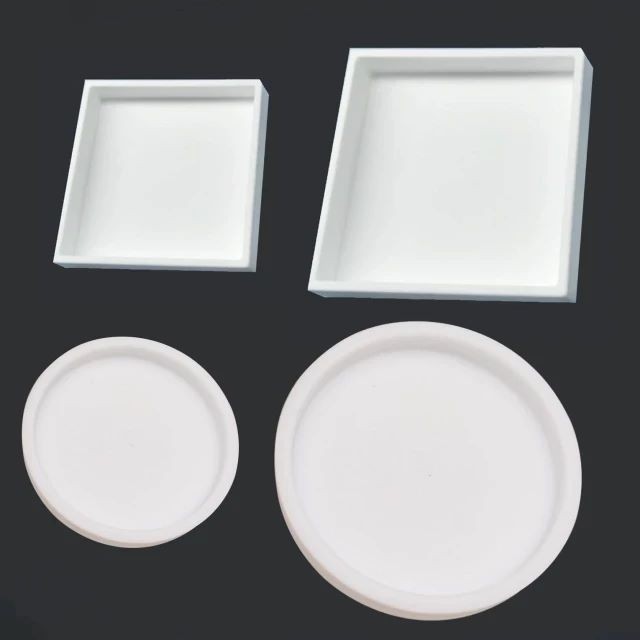
PTFE(Teflon) Labware
Custom PTFE Parts Manufacturer for Teflon Containers and Components
Item Number : PT-1011
Price varies based on specs and customizations
- Temperature Resistance
- -196°C to 450°C
- Chemical Inertness
- Resistant to strong acids, alkalis, and organic solvents
- Biocompatibility
- Non-toxic and suitable for medical and food-grade applications
Shipping:
Contact us to get shipping details Enjoy On-time Dispatch Guarantee.
Why Choose Us
Easy ordering process, quality products, and dedicated support for your business success.
Precision PTFE Containers for Your Demanding Applications
KINTEK specializes in manufacturing high-precision PTFE (Polytetrafluoroethylene) containers, essential components for industries where purity, chemical resistance, and reliability are paramount. Designed for semiconductor processing, medical devices, laboratory analysis, and specialized industrial applications, our PTFE containers ensure the integrity of your high-purity chemicals, sensitive samples, and critical processes. Whether you require standard configurations or fully custom-fabricated solutions from prototype to high-volume orders, KINTEK delivers excellence.
Product Showcase: PTFE Container Details
Explore the quality and design of our PTFE containers. (Images below illustrate typical examples – custom configurations are our specialty!)
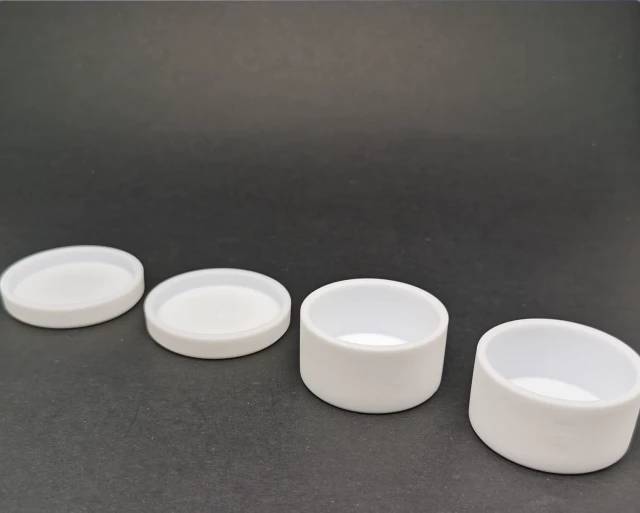
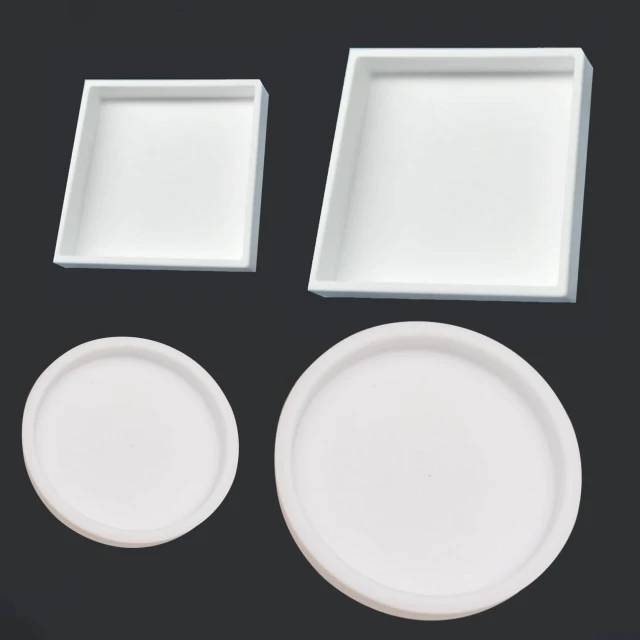
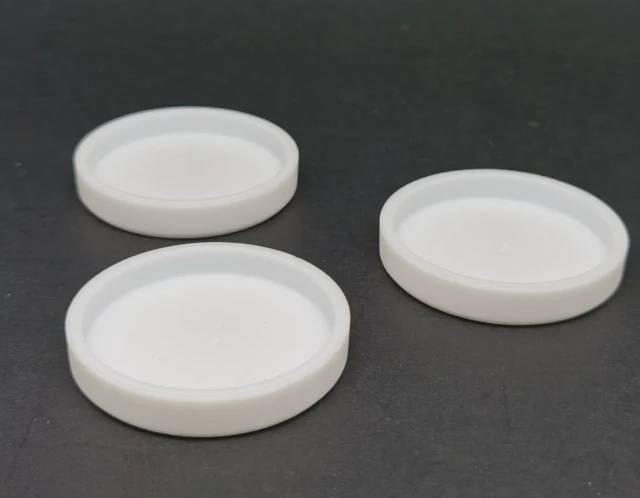
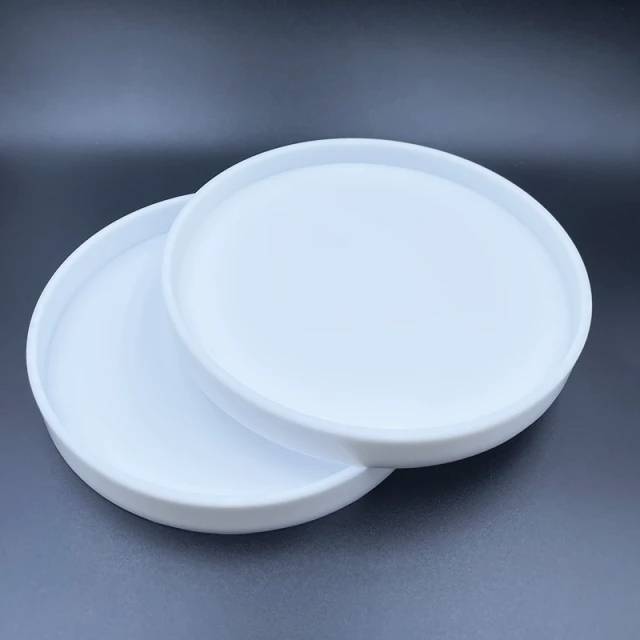
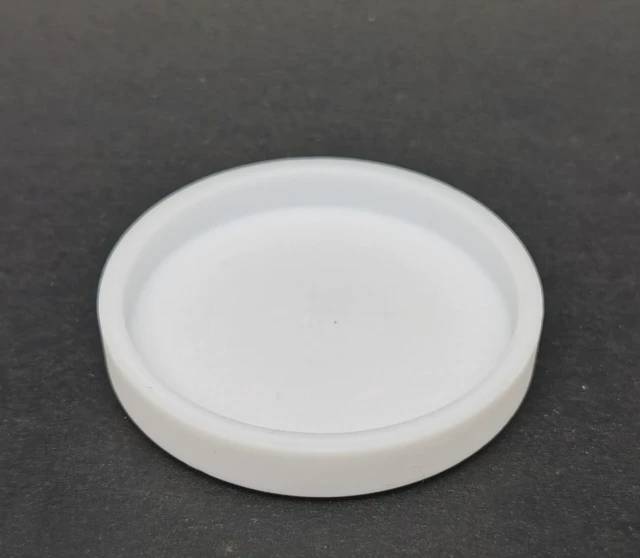
Technical Specifications & Customization
We offer a range of standard sizes and specialize in custom dimensions to meet your precise requirements. Below are examples of common configurations:
| Round Vessel (Outer Dia. * Inner Dia. * Inner Depth) | Square/Rectangular Dish (Inner L x W * Inner Depth) |
| 70mm*60mm*15mm | 60*60mm *15mm |
| 50mm*40mm*15mm | 80*80mm*15mm |
| 60mm*50mm*15mm | 90*90mm*15mm |
| 80mm*70mm*15mm | 100*100mm*15mm |
| 90mm*80mm*15mm | 110*110mm*15mm |
| 100mm*90mm*15mm | 120*120mm*15mm |
| 110mm*100mm*15mm | |
| 120mm*110mm*15mm | |
| 130mm*120mm*15mm | |
| 160mm*150mm*15mm | 200*200*120mm (approx. 5L PTFE cylinder) |
| 92*83*19mm | 10L PTFE cylinder |
| 102*93*20mm | 15L PTFE cylinder |
Don't see your required size? KINTEK excels in custom fabrication. Contact us with your specifications for a personalized quote.
Key Benefits of KINTEK PTFE Containers
Our PTFE containers are engineered to provide superior performance in critical environments:
- Extreme Temperature Resistance: PTFE maintains its mechanical toughness and integrity from cryogenic temperatures (-196°C) up to high heat applications (450°C), ideal for thermal cycling and sterilization.
- Unmatched Chemical Inertness & Corrosion Resistance: Virtually impervious to strong acids, strong alkalis, organic solvents, and other aggressive chemicals. This ensures product purity and container longevity, critical for semiconductor manufacturing, chemical processing, and laboratory work.
- Non-Stick & Easy to Clean Surface: The inherently low surface tension and lubricity of PTFE mean materials don't adhere easily. This translates to stain resistance, simplified cleaning, reduced cross-contamination, and maximized sample recovery – vital for high-purity and analytical applications.
- Non-Toxic & Biocompatible: PTFE is a colorless, odorless, and non-toxic material. Its biocompatibility makes it suitable for medical, pharmaceutical, and even food-grade applications where safety and purity are non-negotiable.
Partner with KINTEK for Your PTFE Component Needs
At KINTEK, we leverage our expertise in precision production to deliver PTFE containers and other components that meet the stringent demands of your industry. From initial design and prototyping to high-volume manufacturing, we are your trusted partner.
Ready to discuss your specific requirements or get a quote for custom PTFE containers? Please fill out our contact form, and our specialists will be in touch promptly.
Trusted by Industry Leaders
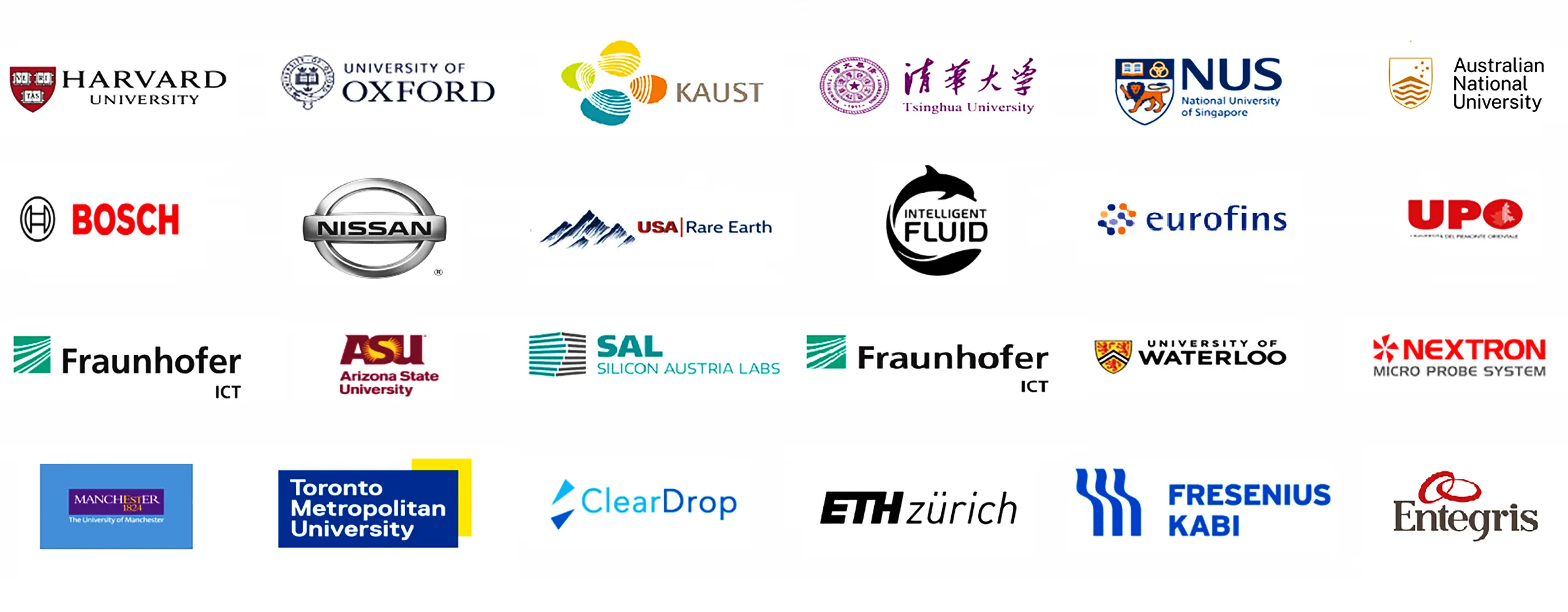
FAQ
What Are The Main Applications Of PTFE Components?
What Are The Main Applications Of PTFE Parts?
What Are The Main Applications Of PTFE Discs?
What Are The Main Applications Of PTFE Gaskets?
What Are The Common Applications Of PTFE Barrels?
What Are The Main Applications Of Custom Teflon Parts?
What Are The Main Applications Of PTFE Rings?
What Are The Main Applications Of PTFE Glands?
What Are The Common Applications Of PTFE Seal Rings?
What Are The Main Applications Of PTFE Labware?
What Are The Main Applications Of PTFE Rollers?
What Are The Main Applications Of Teflon Seals?
What Are The Main Applications Of Custom PTFE Products?
What Are The Common Applications Of Teflon Balls?
What Are The Main Applications Of PTFE Brushes?
What Are The Key Features Of PTFE Components?
What Are The Key Features Of PTFE?
What Are The Key Features Of PTFE Discs?
What Are The Key Features Of PTFE Gaskets?
What Are The Key Features Of PTFE Barrels?
What Are The Key Features Of Custom Teflon Parts?
What Are The Key Features Of PTFE Rings?
What Are The Key Features Of PTFE Glands?
What Are The Features Of A Spring PTFE Sealing Ring?
What Are The Key Features Of PTFE Labware?
What Are The Key Features Of PTFE Rollers?
What Are The Key Features Of Teflon Seals?
What Are The Key Features Of PTFE That Make It Suitable For These Applications?
What Are The Key Features Of Teflon Balls?
What Are The Key Features Of PTFE Brushes?
What Are The Key Components Of PTFE (Polytetrafluoroethylene)?
How Do PTFE O-ring Seals Work?
How Do PTFE Discs Work In Sealing Applications?
What Is The Principle Behind PTFE Gaskets?
How Does A PTFE Lined Butterfly Valve Work?
What Are The Advantages Of Using Custom Teflon Parts?
How Are PTFE Rings Manufactured?
How Does A PTFE Lined Butterfly Valve Operate?
What Makes PTFE Suitable For Labware?
How Are PTFE Rollers Manufactured?
How Do Teflon Seals Work In Harsh Environments?
How Is PTFE Processed Into Custom Parts?
What Are The Technical Specifications Of Teflon Balls?
What Is The Principle Behind PTFE Brushes?
What Are The Advantages Of Using PTFE Components?
What Are The Advantages Of Using PTFE Parts?
What Are The Advantages Of Using PTFE Discs?
What Are The Advantages Of Using PTFE Gaskets?
What Are The Advantages Of Using PTFE Barrels?
Why Is Teflon Preferred For High-temperature Applications?
What Are The Advantages Of Using PTFE Rings?
What Are The Advantages Of Using PTFE Glands?
What Are The Advantages Of Mechanical Seals With PTFE Rings?
What Are The Advantages Of Using PTFE Labware?
What Are The Advantages Of Using PTFE Rollers?
What Are The Advantages Of Using Teflon Seals?
What Are The Advantages Of Using Teflon Balls?
What Are The Advantages Of Using PTFE Brushes?
Why Are PTFE Components Ideal For Chemical And High-temperature Applications?
Why Is PTFE Suitable For CNC Machining?
Why Are PTFE Discs Preferred In High-temperature Environments?
How Are PTFE Gaskets Installed?
Why Are PTFE Barrels Suitable For Laboratory Use?
Can Custom Teflon Parts Be Used In The Food And Beverage Industry?
Why Are PTFE Rings Preferred In The Semiconductor Industry?
Are Custom PTFE Glands Available For Specific Applications?
Why Is PTFE Used In Medical Applications?
What Types Of PTFE Labware Are Available?
Why Are PTFE Rollers Preferred In The Chemical Industry?
Are Teflon Seals Environmentally Friendly?
Why Is PTFE Preferred In The Medical And Food Industries?
Why Are Teflon Balls Preferred In Medical And Food Industries?
Are PTFE Brushes Safe For Food And Medical Applications?
How Do PTFE Components Perform In Cryogenic Conditions?
What Types Of PTFE Parts Are Commonly Manufactured?
Are PTFE Discs Resistant To Chemicals?
What Makes Teflon Suitable For Electrical Insulation?
Are PTFE Rings Suitable For Medical Applications?
Can PTFE Rollers Be Customized For Specific Applications?
What Types Of Custom PTFE Products Are Available?
Can Teflon Balls Be Customized For Specific Applications?
How Does The Chemical Resistance Of PTFE Brushes Benefit Industrial Applications?
What Makes PTFE Discs Non-stick?
What Makes PTFE Brushes Suitable For High-temperature Environments?
Can PTFE Discs Be Used In Electrical Applications?
Why Are PTFE Brushes Preferred For Electrical Insulation?
How Do PTFE Discs Perform In Low-temperature Environments?
Are PTFE Discs Customizable For Specific Applications?
4.9 / 5
Incredible quality and precision! These PTFE parts exceeded my expectations. Worth every penny!
4.8 / 5
Fast delivery and top-notch durability. Perfect for our lab needs. Highly recommend!
4.7 / 5
The PTFE components are flawless. Superb craftsmanship and excellent value for money.
4.9 / 5
Cutting-edge technology and unbeatable quality. These parts are a game-changer!
4.8 / 5
Reliable and durable. The PTFE containers are perfect for high-temperature applications.
4.9 / 5
Exceptional service and premium quality. These parts are built to last. Impressed!
4.7 / 5
Precision-engineered PTFE parts that deliver outstanding performance. Very satisfied!
4.8 / 5
Quick turnaround and superior quality. These components are worth the investment.
4.9 / 5
The PTFE parts are incredibly durable and precise. Perfect for industrial use. Love it!
4.8 / 5
High-quality materials and excellent craftsmanship. These parts are a cut above the rest.
4.9 / 5
Top-tier PTFE components with flawless performance. Delivered faster than expected!
4.7 / 5
Great value for money. The PTFE containers are robust and reliable. Highly recommend!
4.8 / 5
Superior quality and fast shipping. These parts are perfect for our chemical applications.
4.9 / 5
Innovative design and unbeatable durability. These PTFE parts are a must-have!
4.8 / 5
Exceptional craftsmanship and quick delivery. The PTFE components are flawless.
4.7 / 5
High-performance PTFE parts that deliver every time. Excellent service too!
4.9 / 5
Perfect fit and outstanding durability. These parts are worth every cent. Love them!
4.8 / 5
Premium quality and fast turnaround. These PTFE components are simply the best.
REQUEST A QUOTE
Our professional team will reply to you within one business day. Please feel free to contact us!
Related Products

Custom PTFE Parts Manufacturer for Teflon Parts and PTFE Tweezers
KINTEK prioritizes precision production and offers custom fabrication from prototypes to high-volume orders.

Custom PTFE Square Trays for Industrial and Laboratory Use
Premium PTFE square trays for labs & industry. Chemical-resistant, non-stick, high-purity PTFE trays for semiconductors & medical use. Custom sizes available.

Custom PTFE Measuring Cylinders for Advanced Scientific and Industrial Applications
Discover the superior performance of our Polytetrafluoroethylene (PTFE) measuring cylinders, engineered for precision and resilience in demanding environments.

Custom PTFE Volumetric Flasks for Advanced Scientific and Industrial Use
Premium PTFE volumetric flasks for labs – chemical-resistant, non-stick, precise measurements. Ideal for semiconductor, medical & analytical applications. Shop now!

Customizable PTFE Seals Filter Holders for Versatile Applications
Enhance filtration with KINTEK's PTFE-sealed filter holders for leak-proof, chemical-resistant performance in labs and industries. Explore now!

Custom PTFE Bottles for Diverse Industrial Applications
High-purity PTFE bottles for chemical storage, resistant to acids & solvents. Wide/narrow mouth options, leak-proof, durable. Ideal for labs & industry.

Custom PTFE Teflon Parts Manufacturer PTFE Cleaning Rack
High-purity PTFE flower baskets for labs & semiconductor use. Chemical-resistant, -180°C to +250°C, custom sizes available. Contact KINTEK today!

Custom PTFE Teflon Parts Manufacturer Conductive Glass Substrate Cleaning Rack
High-purity PTFE flower baskets for lab cleaning, resistant to chemicals & extreme temps. Custom designs available for semiconductor & medical applications.

Customizable PTFE Three Neck Flasks for Advanced Chemical Applications
Our high-performance Three-Neck Round-Bottom Flasks are expertly crafted from pure Polytetrafluoroethylene (PTFE), a material renowned for its exceptional properties, making it ideal for demanding laboratory and industrial environments.

Custom PTFE Sleeves and Hollow Rods for Advanced Applications
High-performance PTFE hollow rods & sleeves for chemical resistance, thermal stability, and low friction. Custom sizes available. Contact KINTEK today!

Customizable PTFE Rods for Advanced Industrial Applications
High-performance PTFE solid rods for chemical-resistant, low-friction components. Ideal for lab, medical & industrial applications. Custom machining available.

Custom PTFE Teflon Balls for Advanced Industrial Applications
Precision PTFE balls for chemical, medical & industrial use. High-performance, low-friction, chemical-resistant. Custom sizes available. Get a quote today!

Custom PTFE Teflon Parts Manufacturer PTFE Magnetic Stirring Bar
KINTEK PTFE magnetic stirring bars offer chemical resistance, high-temperature stability, and smooth mixing for labs. Ideal for diverse applications.

Custom PTFE Teflon Parts Manufacturer Adjustable Height Flower Basket
High-purity PTFE adjustable height flower baskets for semiconductor and lab use. Chemical-resistant, non-stick, and customizable. Get yours today!

Customizable PTFE Crucibles for Laboratory and Industrial Applications
High-purity PTFE crucibles with lids for labs. Chemical-resistant, non-stick, and durable. Ideal for sample digestion, AA, ICP-MS. Custom sizes available.

Custom PTFE Microwave Digestion Vessels for Demanding Applications
High-purity PTFE microwave digestion vessels for safe, contamination-free sample prep. Ideal for ICP-MS, AAS, and trace analysis. Custom sizes available.

Custom Machined Molded PTFE Teflon Parts Manufacturer for Laboratory ITO FTO Conductive Glass Cleaning Flower Basket
High-purity PTFE flower baskets for semiconductor & lab use. Chemical-resistant, custom designs available. Ideal for silicon wafers & glass substrates.

PTFE Chemical Solvent Sampling Spoon
Discover our high-purity PTFE (Polytetrafluoroethylene, commonly known as Teflon) Sampling Spoons, meticulously engineered for the safe, precise, and contamination-free handling of chemicals, solvents, powders, and various samples.

PTFE Deep Evaporating Dishes Customizable Laboratory and Industrial Solutions
High-quality PTFE deep evaporating dishes for labs. Chemical-resistant, non-stick, and customizable. Ideal for sample handling. Get yours now!
Related Articles

Why Your High-Performance PTFE Parts Fail—And Why It's Not the Material's Fault
Discover the hidden reason your critical PTFE components fail. It's not the material, but the fabrication. Learn how to get reliable parts.

How PTFE Solves Critical Industrial Challenges Through Material Superiority
Discover how PTFE's chemical resistance, thermal stability, and durability solve critical industrial challenges in aerospace, chemical processing, and more.

The Unseen Workhorse: Why PTFE Is the Default Choice for Impossible Problems
Explore why PTFE's unique physics—near-zero friction and total chemical inertness—make it a strategic solution for engineering's toughest challenges.

The Physics of a Perfect Fit: How PTFE Eliminates an Athlete's Hidden Distractions
Discover how PTFE's unique physics enhances athletic performance by ensuring a secure fit and maintaining traction, eliminating critical distractions.

Beyond "Non-Stick": Why Your PTFE Components Fail and How to Fix It for Good
Learn the hidden engineering trade-off that causes PTFE parts to fail and how precision fabrication is the key to unlocking their true reliability.

The Unseen Component: How PTFE Became the Bedrock of Medical Device Reliability
Discover how PTFE's unique trio of biocompatibility, low friction, and chemical inertness solves critical safety and performance challenges in medical devices.

The Engineer's Dilemma: Navigating the Trade-offs Between PTFE and Its Alternatives
Choosing between PTFE and PTFE-free components isn't about finding a better material, but making a precise engineering decision based on priorities.

The Asymmetric Cost of Failure: Why Precision PTFE Is Your Last Line of Defense
Learn how PTFE components save money not by being reusable, but by preventing catastrophic analytical failures and mitigating invisible financial risks.

When "Chemically Inert" Isn't Enough: The Hidden Cause of PTFE Component Failure
Discover why standard PTFE components fail in critical applications, even with 'safe' chemicals. Learn the hidden role of fabrication quality and how to prevent costly downtime.

When 'Chemically Inert' Isn't Enough: Why Your PTFE Components Fail and How to Prevent It
Discover why even high-quality PTFE components can unexpectedly fail. Learn the hidden chemical exceptions and how to select the right material.

Why Your Lab Plugs Stick and Contaminate: The Hidden Science of Surface Energy
Frustrated with seized plugs and failed experiments? Learn the hidden physics of surface energy and why precision PTFE components are the definitive solution.

Beyond Friction: Why Your PTFE Components Fail and How to Engineer for Reliability
Tired of bushing failures? Learn why focusing only on low friction is a mistake and discover how to engineer PTFE components for true long-term reliability.